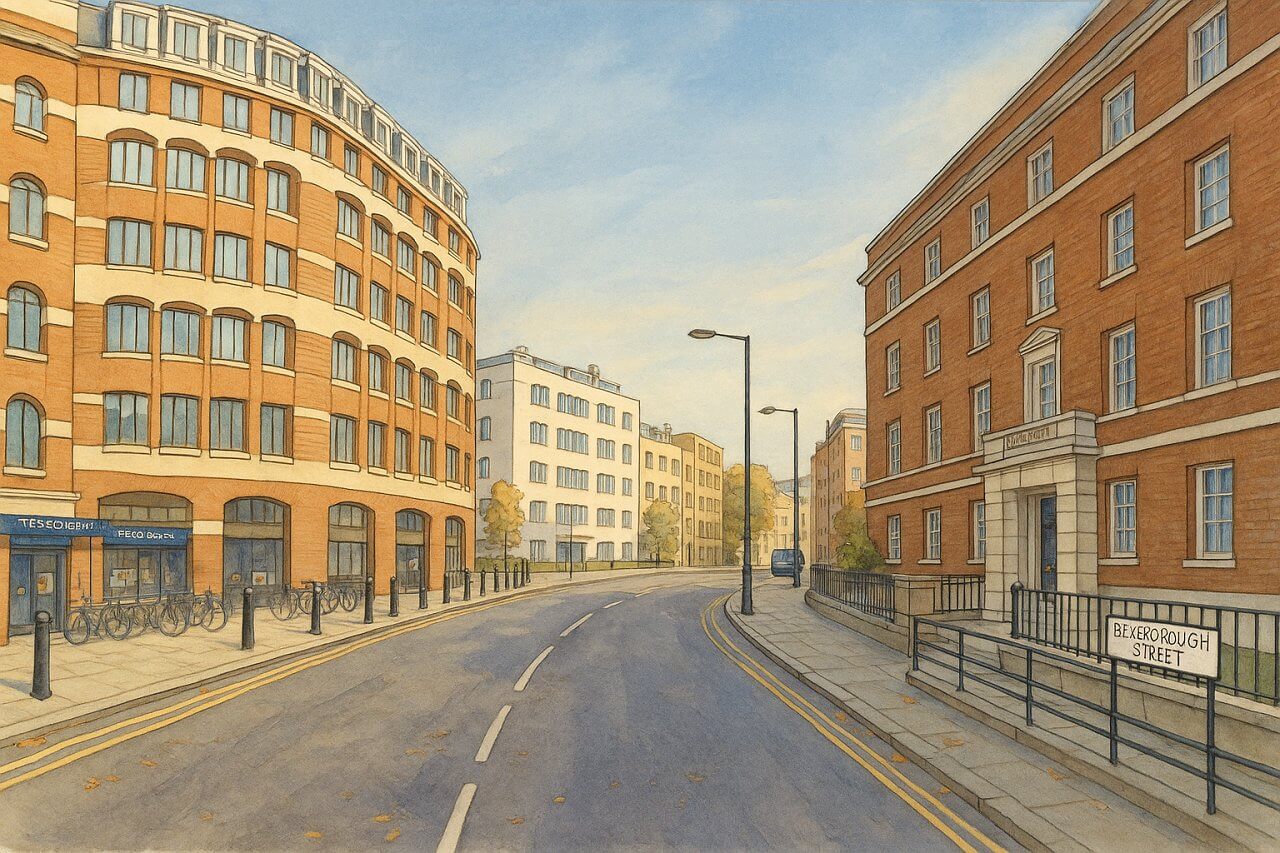
Bessborough Street, London
Bessborough Street, a quiet and elegant road in the heart of Pimlico
Bessborough Street is a street in the Pimlico district of the City of Westminster, Central London. It runs from Lupus Street at its western end to Drummond Gate at its eastern end.
Located just west of Vauxhall Bridge Road, it runs parallel to the Thames and sits within the quiet, residential grid layout typical of Pimlico. Bessborough Street is less trafficked than the major roads nearby, giving it a more tranquil and secluded feel while still enjoying excellent proximity to Central London landmarks.
How Long is Bessborough Street?
Bessborough Street is approximately 300 metres (984 feet) long. The street is one-way for vehicular traffic, heading northbound from Lupus Street towards Drummond Gate. It intersects with Bessborough Gardens and offers access to local residences, businesses, and a few institutional buildings.
Streets branching from Bessborough Street
- Aylesford Street
- Balniel Gate
- Bessborough Place
- Rampayne Street
History of Bessborough Street
Like much of Pimlico, Bessborough Street was laid out in the early-to-mid 19th century as part of the large-scale development led by master builder Thomas Cubitt. The Pimlico area was transformed from marshy Thames-side land into a desirable district for the middle and upper-middle classes during Queen Victoria’s reign.
Bessborough Street was likely constructed in the 1840s or early 1850s, forming part of the southern extension of Cubitt’s grid system. While never a major thoroughfare, it served as a useful connector for local traffic and utility access within Pimlico.
Origin and Meaning of the Name "Bessborough"
The street takes its name from the Irish aristocratic title Viscount Bessborough, held by the Ponsonby family. The naming most likely honours John Ponsonby, 4th Viscount Bessborough (1781–1847), a Whig politician who served as Lord Lieutenant of Ireland and held various government posts during the early 19th century.
Pronunciation: “Bessborough” is pronounced BESS-bruh, with the IPA transcription being /ˈbɛs.brə/  . The “borough” ending is typically reduced in spoken English, a common trait in British place names.
. The “borough” ending is typically reduced in spoken English, a common trait in British place names.
Despite appearances, the use of “borough” in the name does not indicate that the area was once an independent borough in the civic or municipal sense. It is simply part of the aristocratic title and reflects noble association, not administrative status.
Character and Atmosphere
Bessborough Street today exudes a calm, understated charm. Unlike some of the grander squares and boulevards nearby, it is largely residential and utilitarian in tone. The buildings are a mixture of post-war brick apartment blocks, office buildings, and institutional facilities, such as local NHS services and small-scale administrative centres.
The street feels self-contained and is rarely busy, thanks to its one-way traffic system and lack of commercial activity. The nearby Bessborough Gardens offers a green breathing space, and the River Thames is only a short walk away.
Property Prices and Types
As of May 2025, property on Bessborough Street remains more affordable than in the broader Pimlico area, which in turn is usually cheaper than Westminster to the north or Belgravia to the west. Residential properties are typically flats within 1950s–1970s low-rise blocks.
A two-bedroom flat here typically sells for around £750,000 to £950,000, depending on the condition and exact square footage. Most flats range in size from 650–850 sq ft (60–79 sq m).
Rental values range from around £2,300 to £2,900 per month for similar two-bedroom properties. These prices are attractive for those seeking a central location without the premium of neighbouring Belgravia or Westminster proper.
Nearest London Underground Stations
Bessborough Street is excellently served by public transport. The nearest London Underground stations include:
- Pimlico Station – Located just a 4-minute walk away, served by the Victoria line.
- Vauxhall Station – About a 10-minute walk over Vauxhall Bridge, served by the Victoria line and National Rail services.
- Victoria Station – Around 15 minutes away on foot, offering Victoria, District, and Circle lines, plus mainline rail.
Nearby Bus Stops
There are convenient bus stops located along Lupus Street and Vauxhall Bridge Road, each just a short walk from Bessborough Street. These stops are served by several useful routes:
- Bus 24 – Hampstead Heath to Pimlico
- Bus 360 – Elephant & Castle to Royal Albert Hall
- Bus C10 – Canada Water to Victoria
These bus routes connect Bessborough Street directly to major London hubs, making the area practical for commuters and visitors alike.
Fun Fact
In the 1970s, part of Bessborough Street was briefly used as a filming location for the British spy series “Callan”, starring Edward Woodward. Its modest, institutional-looking architecture made it a fitting backdrop for scenes involving government offices and clandestine operations. The segment was filmed outside what is now a local NHS administrative building.
Quick Facts
- Location: Pimlico, City of Westminster
- Length: Approx. 300 metres (984 feet)
- Direction: One-way (south to north)
- Connects: Lupus Street to Drummond Gate
- Nearest Tube: Pimlico (Victoria line)
- Nearby Bus Routes: 24, 360, C10
- Property Prices (May 2025): £750,000–£950,000 for 2-bed flats (~650–850 sq ft / 60–79 sq m)
- Named After: Viscounts Bessborough
- Pronunciation: BESS-bruh (/ˈbɛs.brə/)
- Fun Fact: Filming location for 1970s TV spy drama "Callan"
Map of Bessborough Street, London

Painting of Bessborough Street, London (View image in full size)